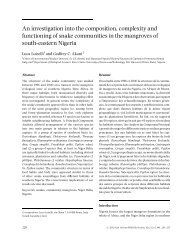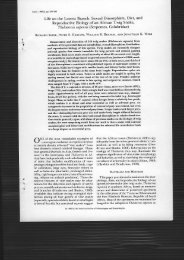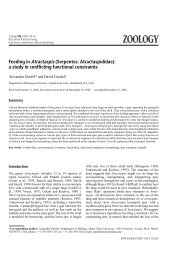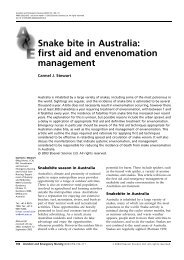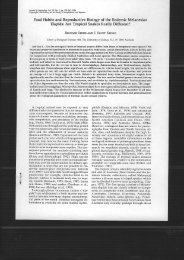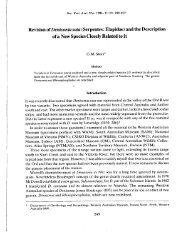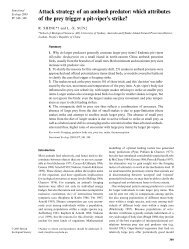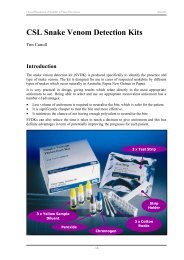Introduction - Kingsnake.com
Introduction - Kingsnake.com
Introduction - Kingsnake.com
You also want an ePaper? Increase the reach of your titles
YUMPU automatically turns print PDFs into web optimized ePapers that Google loves.
Clinical Management of Snakebite in Papua New Guinea<br />
<strong>Introduction</strong><br />
<strong>Introduction</strong><br />
David Williams<br />
Many of us know the feelings of urgency and helplessness that <strong>com</strong>e when a sudden knock at<br />
the door in the early hours of morning brings the news of yet another seriously ill snakebite<br />
patient arriving at our aid posts, health centres and hospitals. Often these patients will already<br />
be in the terminal stages of severe neurotoxic paralysis, and without transport, medicines or<br />
modern hospital equipment, we are left with little to do but stand by and watch as they slowly<br />
slip away to be<strong>com</strong>e yet another victim of the deadly reptiles that live in our midst.<br />
Snakebite is a medical emergency, and we live in a country where venomous snakes, although<br />
few in variety, are many in number. As you will hear during this course, the incidence and<br />
mortality rates after snakebite in Papua New Guinea are among the highest reported in any<br />
part of the world. This is in stark contrast to the experience of our neighbour Australia.<br />
Despite having many of the same species, and much higher populations living in areas with<br />
abundant snake populations, snakebite in Australia is a very minor problem at <strong>com</strong>munity<br />
level. With just one quarter of Australia’s population, and perhaps 200 more deaths from<br />
snakebite each year, PNG’s snakebite mortality rate may be as much as 800 times greater than<br />
Australia. The gap between PNG’s snakebite problem and snakebite in Australia does not end<br />
there.<br />
With a much larger revenue-contributing population, stronger resource base and solid<br />
economic foundation, Australia has some of the best medical facilities in the world. Even in<br />
many of our smaller towns and villages, there are qualified doctors working in hospitals that<br />
are well equipped. In our most remote areas we are able to extend viable emergency medical<br />
services with a long-established privately-funded aeromedical retrieval service, the Royal<br />
Flying Doctor Service. A person bitten by a venomous snake in Australia’s arid heart can be<br />
retrieved using a well-equipped medical airplane, and may find themselves recovering in a<br />
large, modern city hospital in just a matter of hours. Snakebite is, nevertheless, still<br />
considered to be a very serious medical condition, and even in the most modern Australian<br />
intensive care units, snakebite patients may still have a guarded prognosis.<br />
Here in PNG, where the economic base of the country remains in its formative years, the<br />
challenges of basic service delivery, education, transport, health, housing and policing remain<br />
great. With limited resources, and a plethora of important health issues to over<strong>com</strong>e, PNG<br />
faces a much more difficult road to prosperity. Common diseases like measles kill hundreds<br />
every year, malaria and other tropical illnesses are endemic, and the spectre of HIV/AIDS<br />
currently looms like a guillotine above the head of a condemned man. Rural hospitals and<br />
clinics do not usually have qualified doctors on hand, and resources, equipment and essential<br />
drugs are often in short supply. Medical evacuations, if and when they are carried out, <strong>com</strong>e at<br />
a high cost, one beyond the economic means of most grassroots Papua New Guineans.<br />
Relative antivenom costs in PNG are much higher than in Australia, and high prices mean that<br />
even with increases in funding allocations, there simply is not enough money available to<br />
purchase sufficient antivenom for all cases. Without the benefits of modern medical facilities,<br />
a Papua New Guinean snakebite victim faces a struggle to survive that is frequently lost.<br />
-1-



